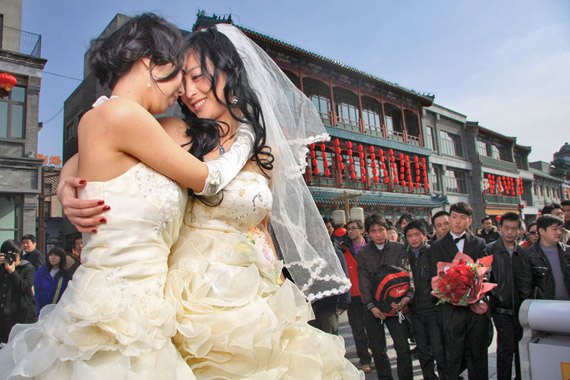As China prepares to revise its civil code, calls are renewed for legal recognition of same-sex marriage

In April 2016, Sun and his boyfriend Hu Mingliang filed a lawsuit against authorities in Changsha, capital city of China’s southern Hunan Province, after they were unable to get a marriage license. They lost the case, as the court ruled that China’s Marriage Law does not recognize same-sex marriage. But the case, being the first of its kind, attracted considerable media attention.
Two years later, Sun Wenlin is again at the center of a heated discussion, after he responded to a government call for public consultation to a proposed revision of the country’s civil code, which includes provisions on contract rights, marriage and family, torts, and more. (As of October 24, there were more than 380,000 public submissions; the consultation period closes on November 3.) On his official WeChat account, Sun suggested including legal protection for same-sex marriage and called for lesbian, gay, and bisexual communities to submit similar proposals to the government.
His call quickly attracted more than 100,000 views on WeChat and ignited a fierce public debate. One commenter wrote, “This proposal has my unconditional support. Before my lover died of illness in June, we had always wanted our partnership to be legally recognized. He couldn’t live to see the day when marriage equality becomes a reality. I’ll regret it for the rest of my life. As a legal professional, I would like to fight [for marriage equality] for him, for myself, and for people who have the same demands as us. I will ask my friends to do this with me.”
Sun is trying to bring the issue of marriage equality into mainstream discourse in China. But for lesbian, gay, and bisexual couples, marriage — or the lack thereof — constantly shapes, if not limits, their expectations of what an intimate relationship can be, and affects their ability to plan for a future with their partner.
Simin*, a bisexual woman from Tianjin in her mid-20s, has been in a relationship with her girlfriend for three years. They met each other through work. She is madly in love, and if given the opportunity, would like to walk down the aisle with her partner.
“Although marriage is only a formality, to me this is a way to tell the world about my wonderful relationship,” Simin said. “Otherwise, no one will know how lovable my significant other is!”
Unfortunately, the Marriage Law in China only recognizes union between a man and a woman. The very first Marriage Law of the People’s Republic of China was enacted in 1950. It has since been superseded by the current Marriage Law, promulgated in 1980 and amended in 2001.
In a country like China, marriage also symbolizes one’s respect and love for one’s parents and ancestors. Getting married is regarded as a filial obligation. Parents expect their children to tie the knot in their 20s and then to have their own children, extending the family line.
“If I can get married, it also means I can be accepted by my family. I won’t have to lie to them anymore,” Simin said. “Right now, my parents are always asking when I’ll get married, but I can’t even tell them about my relationship.”
Mei, a lesbian woman from Guangdong, spells out what it means when she cannot legally marry the woman she loves: “Even if I were to convince my partner to marry me, and have my parents’ support — even if I find the best wedding host, fill all the seats at the banquet and receive blessings from all our loved ones at our dream ceremony — I still won’t be able to put her name down as my ‘family member’ on legal documents.”
Even if they have a big wedding party, the marriage won’t be recognized under the law. “We want to have our own children and nurture them the way we want, looking after them as parents are supposed to. However, we can’t, because we are told that what we want is not ‘legal.’”
The non-inclusive Marriage Law makes it almost impossible for lesbian, gay, and bisexual people in China to have children. Chengwen, a university student from Guangzhou, often discusses this with her same-sex partner: “My partner really wants to have children. We can’t think of any way to do it other than leaving China. This is the only way we will both be our children’s parents.”
Under the current regulation, same-sex couples in China are not allowed to use any assisted reproductive technology (ART), including in vitro fertilization (IVF). It is not possible for an unmarried woman to receive any ART treatment, making it impossible for Chengwen or her partner to bear their own child.
Although the Adoption Law does not ban unmarried people from adopting, if Chengwen and her partner want to adopt a child in China, only one of them will be legally recognized as the guardian of the adopted child, as same-sex couples are not eligible for jointly adopting children. Chengwen and her partner feel there is simply no way they can experience parenthood in their home country together.
“It is very expensive to emigrate and get a sperm donation overseas,” Chengwen said. “It also means I will have to give up my career here in China.”
Even for same-sex couples who do not plan to have children, building a future together is extremely difficult when their union is not recognized under Chinese law.
“It’s impossible for us to truly be part of society,” Simin said. “We are forced to bear higher costs of living because we are not eligible for a lot of state welfare. Currently, many cities only provide free medical check-ups for married women. Same-sex couples also cannot apply for public rental housing as a family.
“I am worried that when we are too old to take care of each other, our lives will become miserable.”
Many Chinese see marriage as an answer to our universal need for trust, love, partnership, and acceptance. Laws that inhibit same-sex couples from forging committed and loving partnerships continue to be a source of anguish for those in the China’s lesbian, gay, and bisexual communities. But some see a glimmer of hope.
“It’s a good move to lobby for the recognition of same-sex marriage by answering the government’s call to revise the draft civil code,” says Kelin, a gay man based in Beijing. “Society is really paying attention to the issue now. Many people stand with us.”
A national survey on social attitudes towards sexual orientation, gender identity, and gender expression reveals that nearly 85% of more than 10,000 respondents support legalization of same-sex marriage.
Although not without its detractors, Sun Wenlin’s proposal to make the civil code more inclusive has received a lot of support, and the hashtag “civil code, same-sex marriage” (#民法典同性婚姻) has already attracted 70 million views and almost 130,000 posts on Weibo, China’s equivalent of Twitter.
China is one of many countries in East Asia that has yet to recognize same-sex partnerships and address discrimination based on sexual orientation, gender identity, gender expression, and sex characteristics. But the tide may be changing in the region: Taiwan’s fight for marriage equality is gaining traction — there was a massive rally on Sunday ahead of a November 24 vote — even though it has a law that criminalizes sex outside of marriage (a law that disproportionately impacts women). Nine municipalities in Japan are considering offering certificates for same-sex unions. Tokyo was the first municipality in Japan to adopt ordinances banning discrimination based on sexual orientation and other status.
When will China follow suit?
Sun Wenlin’s call for a civil code that recognizes same-sex marriage is not only an opportunity for netizens to chime in on marriage equality, but also a chance for Chinese society to see that no one should be rejected for marriage just because of who they love.
*Other than Sun Wenlin and Hu Mingliang, all names are pseudonyms.





